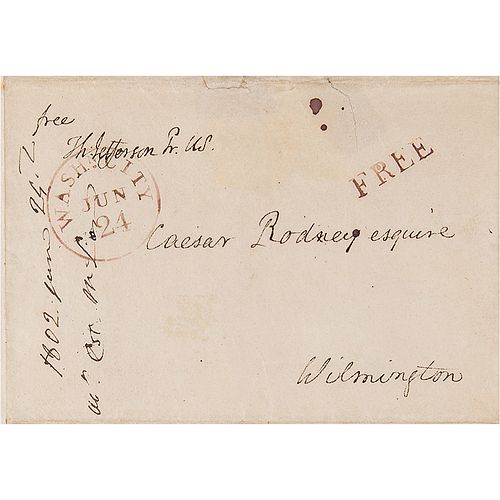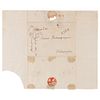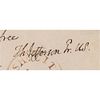Thomas Jefferson Signed Free Frank as President to Caesar Rodney
Two ways to bid:
- Leave a max absentee bid and the platform will bid on your behalf up to your maximum bid during the live auction.
- Bid live during the auction and your bids will be submitted real-time to the auctioneer.
Bid Increments
| Price | Bid Increment |
|---|---|
| $0 | $5 |
| $50 | $10 |
| $200 | $25 |
| $500 | $50 |
About Auction
Mar 13, 2024
RR Auction's March 2024 Fine Autographs and Artifacts auction features 650+ rare and remarkable items. The sale is highlighted by a robust selection of original animation artwork, including Eyvind Earle's remarkable landscape panoramas, Mary Blair's whimsical concept paintings, and production cels from Walt Disney classics like Snow White, Pinocchio, Lady and the Tramp, Peter Pan, and Cinderella. RR Auction support@rrauction.com
- Lot Description
Exceptional full hand-addressed and signed free frank as president, measuring 9.75 x 8 unfolded with a central panel of 5 x 3.5, addressed in Jefferson's hand to "Caesar Rodney esquire, Wilmington," and franked in the upper left, "free, Th: Jefferson, Pr. U.S." Postmarked "Free" at Washington City on June 24, [1802]. Annotated along the border in another hand with the year and subject: "McL." In very good to fine condition, with some old mounting remnants to the lower panel, and seal-related paper loss, not affecting the franking panel itself. Accompanied by an engraved portrait featuring Jefferson's facsimile signature.
The recipient, Caesar Augustus Rodney (1772-1824), a nephew of Caesar Rodney, a signer of the Declaration of Independence, was a leader of the Jeffersonian Democratic-Republican Party in Delaware, where he was serving as a state representative. Rodney and Jefferson exchanged letters often between 1800 and 1823. Most of their correspondence was about political candidates, appointments, events, happenings, policies, and strategies at the state and federal levels. The Democratic Republicans began to dominate the opposing Federalist Party after President John Adams left office in 1801.
This 1802 free franked cover carried a letter about the unsuccessful efforts of Delaware Democratic Republicans to have Federalist Allen McLane (1746-1829) removed from office as Customs Collector at the Port of Wilmington. McLane, a Continental Army officer and spy during the Revolutionary War, was appointed by President George Washington in 1797, and he served in the lucrative position until his death. McLane had previously served under Rodney’s uncle and namesake, Caesar Rodney, in the war.
Delaware Democratic Republicans, including Governor David Hall, forced a grand jury inquiry into possible misconduct in office by McLane, but he was acquitted. Jefferson’s June 24, 1802 letter to Rodney read, in part: 'Some considerations occur at once, that a trial and acquittal, where both parties are fully heard, should be deemed conclusive; that on any subsequent complaint it cannot be regular to look to anything farther back than the trial; that to do this would expose us to a charge of inconsistency which would do great injury to the (Democratic) Republican cause.'
Later in 1802 President Jefferson encouraged and supported Rodney, an attorney by trade, as a candidate on the Democratic Republican ticket against Federalist James A. Bayard for Delaware’s at-large seat in the US House of Representatives. Rodney won a close battle, only to be defeated by Bayard two years later in another hotly contested match between the two longtime friends.
Rodney (1772-1824) was appointed as US Attorney General by Presidents Jefferson and Madison, serving almost five years. Later he again won the at-large seat from Delaware in the US House, and he was elected as a US Senator from Delaware, serving in each seat for about a year. He served in the newly established position of US Minister to Argentina under President Monroe for about five months. - Shipping Info
-
Bidder is liable for shipping and handling and providing accurate information as to shipping or delivery locations and arranging for such. RR Auction is unable to combine purchases from other auctions or affiliates into one package for shipping purposes. Lots won will be shipped in a commercially reasonable time after payment in good funds for the merchandise and the shipping fees are received or credit extended, except when third-party shipment occurs. Bidder agrees that service and handling charges related to shipping items which are not pre-paid may be charged to a credit card on file with RR Auction. Successful international Bidders shall provide written shipping instructions, including specified Customs declarations, to RR Auction for any lots to be delivered outside of the United States. NOTE: Declaration value shall be the item’(s) hammer price and RR Auction shall use the correct harmonized code for the lot. Domestic Bidders on lots designated for third-party shipment must designate the common carrier, accept risk of loss, and prepay shipping costs.
-
- Buyer's Premium



 EUR
EUR CAD
CAD AUD
AUD GBP
GBP MXN
MXN HKD
HKD CNY
CNY MYR
MYR SEK
SEK SGD
SGD CHF
CHF THB
THB





